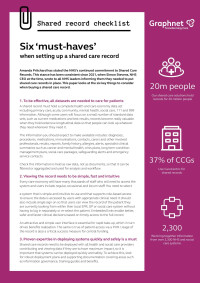Buckinghamshire connects surgical wait lists with shared care record
Read More

View navigation
Solutions
Graphnet’s Shared Care Record Solution is designed to streamline and enhance health and social care services for Integrated Care Systems (ICSs) across the UK.
Trusted by hospitals, councils and others within the ICS framework, Graphnet’s Shared Care Record addresses some of the biggest challenges in healthcare today.
As the leading provider of shared care records in the UK, our work has provided over 20 million individuals with better, faster and more joined-up care. By partnering with commissioners, the solution has been used to successfully:
Reduce hospital admissions
Effectively join up health and social care services
Improve patient engagement
Address critical pressure points within healthcare

Our Shared Care Record solution is adaptable to all four levels of Shared Care Record implementation, ranging from a simple integrated record viewer to a comprehensive, cross-organisational care planning solution.
Level 1: Sharing Information
Our fully integrated digital care record consolidates data from various health organisations and care settings within a designated community, enabling a comprehensive view of patient information.
Level 2: Care Planning Support
At this stage, Graphnet supports community-wide assessments, event-driven alerting, task management, referral, secure instant messaging, workflow and care planning applications.
Patient registers can be created using risk stratification or manual assignment, while care plans can be tailored to suit a wide range of needs, including condition management (such as frailty and heart failure) and end of life preferences.
Level 3: Patient access and engagement
Patients gain access to their own shared care record through the Graphnet Personal Health Record. This enables them to update personal details, self-monitor using wearable devices or telehealth tools, and communicate directly with clinicians in real time, empowering them to take an active role in managing their health.
Level 4: Population Health Management
At the highest level, Graphnet’s Shared Care Record integrates with our Population Health Management Software to provide powerful, data-driven analytics and insights into broader population health trends.
The platform enables the analysis of aggregated patient data from across the care community, utilising risk stratification and other tools. Data can be shared in anonymised, pseudonymized, or plain formats, depending on the data-sharing agreements in place.
Cloud-based platform: Graphnet uses Cloud Based Healthcare Software, ensuring scalability, resilience and top-tier security. Data is processed on Microsoft Azure, using UK-based servers for compliance and reliability.
Interoperability: The platform seamlessly integrates with all major health and social care IT systems across the UK and includes API portals for easy connectivity with third-party applications.
Single Sign-On: Graphnet Shared Care Single Sign-on for Integrated Records enables authorised users to access patient records directly from their existing IT systems, reducing administrative tasks and boosting efficiency.
Mobile Access: The platform is accessible on smartphones, tablets and desktop PCs, allowing health care professionals to view and update patient data from anywhere, at any time.
Comprehensive Digital Care Record: Our fully integrated digital shared care record consolidate data from various care sectors, including hospitals, GPs, community services and social care, providing a comprehensive overview of patient health.
Integrated care plan: Graphnet’s Care Plan Tool enables coordinated workflow management across multi-disciplinary teams, facilitating truly patient-centred care planning.
Graphnet’s expertise in shared care records means that we are well placed to offer advice on what to look for in a shared care record provider. Take a look at this Six ‘must haves’ paper that details the key factors to consider when buying a shared care record.
We have many real-world case studies demonstrating the significant impact of Graphnet’s Shared Care Record Solution.
One of our most notable projects is the development of the Greater Manchester Care Record (GMCR)- a Graphnet-powered digital shared record that integrated patient data for 2.8 million citizens. It is now utilised by health and social care professionals across all 10 localities in the region.
Learn more about how providers are using the GMCR for population health insight across Greater Manchester.
Seamlessly integrates health and social care records for better coordination.
Facilitates information sharing across organisations and settings- closing the gaps between GPs, hospitals, physical and mental health services, and social care.
Provides access to electronic patient record systems at the point of care, ensuring timely, informed decisions.
Accessible records encourage patients to take an active role in their own health management.
Drives service transformation, advancing the innovative care models outlined in the ‘Five Year Forward View.’
Raises digital expertise through the Global Digital Exemplar (GDE) programme. As part of our partnership with System C, we deliver an approved GDE blueprint, developed in partnership with University Hospitals Bristol NHS FT.
At present, health and social care organisations, including the NHS, hold separate records about your health. This makes it challenging and often time-consuming to collate all your medical information in one place.
Graphnet’s Shared Care Record Solution combats this. As the UK’s leading provider of a truly integrated care approach, we are proud to collaborate with the NHS to enhance and streamline the delivery of shared care records for Integrated Care Systems (ICSs) across the country.
Shared care records not only help to reduce hospital admissions and improve patient engagement but also work to tackle health inequalities and prevent major health issues.
By combining health records, health organisations have a more comprehensive, real-time overview of an individual’s health and needs, making it easier to deliver personalised care.
A Shared Care Record is a secure digital system that allows health and social care professionals to access information about a patient’s medical history across different organisations including hospitals, GPs and social care providers.
The goal of a shared care record is to improve the quality and continuity of care by ensuring that the right information is available to the right people at the right time.
Contact us today to learn more about Graphnet’s Shared Care Record Solution.


"CareCentric is well-liked and used by clinical staff in our Trust and across the Dorset community.”
Tracie Tiller, applications programme manager, Bournemouth & Poole Informatics Service
Amanda Pritchard's commitment to shared care records is consistent with former NHS CEO, Simon Stevens' approach of maximising benefits by ensuring buy in and optimising cross organisational use. Graphnet's expertise in share care records means that we are well placed to offer advice on what to look for in a share care record provider.
This paper looks at six key things to consider when buying a shared care record, including data storage, security and minimum criteria from suppliers.
Download the checklist now.

Graphnet works in partnership with its customers to help them identify, monitor and realise benefits. The benefits of sharing data are obvious to anyone who has interacted with the NHS and social care services, either directly themselves or as someone involved in the care of relatives or friends.
The fundamental premise behind Graphnet Shared Care is to use technology and accessibility to information and drive benefits for service providers, patients and those that care for them, professionally and personally. Our focus when designing solutions is to improve the quality of life for patients and support service improvement, efficiency and cost saving opportunities for care providers.
As well as improved patient experience and outcomes, Graphnet delivers a large variety of benefits, financial savings and efficiency gains:
Graphnet Shared Care supports key government initiatives such as: